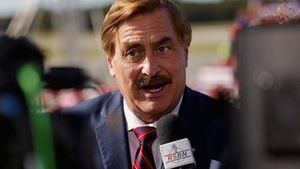Germany faces significant political shifts following the 2025 federal election, as the Social Democratic Party (SPD) grapples with its historic defeat. The election results revealed the SPD's struggles, with party leader Lars Klingbeil acknowledging their worst performance ever at just 16.5 percent of the vote, trailing behind the Union parties (CDU/CSU) and the far-right Alternative for Germany (AfD).
The CDU/CSU emerged as the clear winner, securing 28.6 percent of the votes, and the competition for third place was fierce, with the Greens (11.6 percent) and SPD closely following each other. Klingbeil, reflecting on the night of the election, described it as "eine krachende Wahlniederlage" (a resounding electoral defeat) and emphasized the importance of tackling complex issues like modernization and renewal within the party.
Rolf Mützenich, who led the SPD's congressional faction, announced he would step down after falling to the Green's Katharina Dröge in his home district of Köln III, where he attained 25.8 percent against Dröge's 26.1 percent. Mützenich conveyed the disappointing outcomes to his colleagues via letter, urging acknowledgment of the loss of public trust: "Wir müssen anerkennen, dass eine Mehrheit der Wählerinnen und Wähler uns nicht mehr das Vertrauen aussprechen wollte" (We must recognize the majority of voters no longer wanted to place their trust in us).
With Mützenich's resignation, attention shifted to the prospect of younger leadership within the SPD. The party leadership, after much deliberation, decided to merge the positions of party and congressional faction leaders, proposing Klingbeil as the new faction head. He called for a "Generationswechsel" (change of generations) within the party's leadership to rejuvenate the SPD's approach and regain voter confidence.
The implications of this change come at a time when voter engagement surged, resulting in the highest turnout since German reunification, estimated between 83 and 84 percent. Analysts highlight how this record participation allowed the SPD’s failures to resonate more significantly across the voting populace.
The electoral reforms introduced have significantly altered how voters influence parliamentary representation. For the first time, not all district winners automatically secure seats, necessitating sufficient second votes for parties to enter parliament, which complicates party strategies moving forward.
For the SPD, the aftermath of these election results beckons weeks of intense reflection and reorganization as leaders map out plans of action. Klingbeil himself suggested a comprehensive internal review is on the horizon to improve their policies and re-engage with disenchanted voters, especially youth, who played a key role in their decline.
The overall response to the electoral outcome elicited varied viewpoints. The SPD’s electorate aired their discontent, reflected by the rise of the AfD, which claimed over 20 percent of the votes—highlighting shifting sentiments toward nationalist rhetoric and policies. Meanwhile, Mützenich lamented the dire predicament facing the party and urged unity among frustrated members, acknowledging he had exhausted his capabilities to effect change.
Despite the loss, some within the party, like the popular Defense Minister Boris Pistorius, assure their commitment to governance. They claim collaboration is key for future coalition-building, especially with potential partnerships being considered between SPD and CDU/CSU.
Looking at the broader political organicity, this election served as both a referendum on policies and public sentiment during unprecedented times, from dealing with crises stemming from the war in Europe to the socioeconomic fallout exacerbated by the pandemic.
The CDU/CSU now faces the challenge of maintaining public support after winning the election, tasked with forging alliances to govern effectively, particularly with apprehensions surrounding the AfD's influence. Initial polls indicate mixed feelings about coalition preferences among constituents, hinting at future instability.
For the SPD, the road to recovery seems long and uncertain, with voters expected to keep close watch on their restructuring initiatives. Klingbeil acknowledges the current path of renewal within the party is directly tied to their responses moving forward. The coming weeks will undoubtedly test the resilience and adaptability of the historical party as they look to recapture public confidence.



